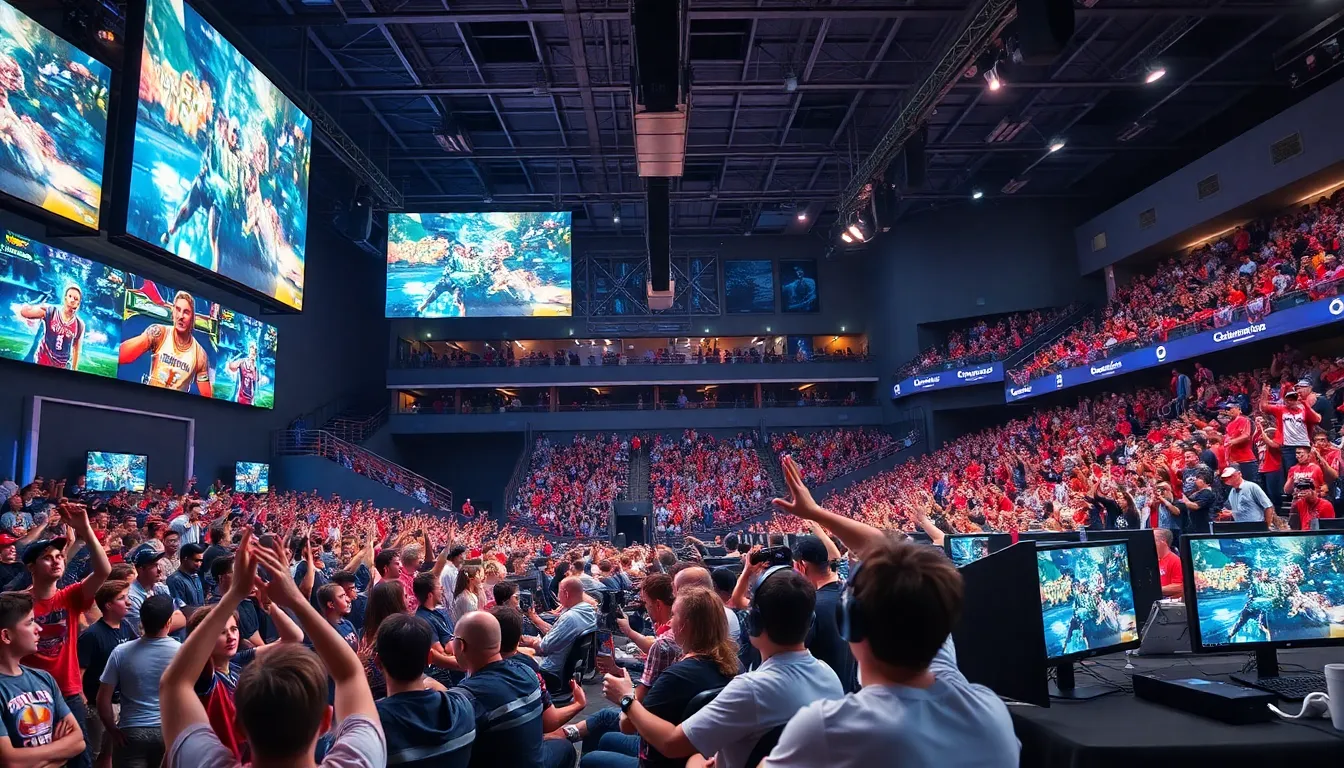Table of Contents
ToggleIn a world where traditional sports are taking a backseat, esports has burst onto the scene like a gamer at a midnight release. With millions glued to their screens, the phenomenon of competitive gaming is no longer just a niche hobby; it’s a global spectacle. From nail-biting championships to jaw-dropping plays, esports is redefining what it means to be an athlete in the digital age.
Overview of Esports Center Stage
Esports encompasses a variety of competitive gaming formats, drawing millions of fans worldwide. The shift from casual gaming to professional leagues showcases this evolution. Key elements include massive tournaments, celebrity players, and impressive sponsorship deals.
Revenues from esports surpassed $1 billion in 2020, with steady growth projected in subsequent years. Major tournaments often fill arenas, reflecting the high demand for live events. With games like League of Legends and Dota 2 commanding significant viewership, esports continues to break records in audience engagement.
Diverse platforms, including Twitch and YouTube, foster community interaction and provide broadcasting for live competitions. Teams operate as traditional sports franchises, complete with coaches, analysts, and support staff. Organizations invest in player development, focusing on skills training and well-being.
In addition, esports promotes inclusivity and diversity, attracting participants from various backgrounds. Many universities now offer scholarships for aspiring esports athletes, affirming its legitimacy. Cross-disciplinary events merge gaming with traditional sports, expanding its reach and appeal.
Media coverage expands significantly, with mainstream networks showcasing esports events. Streaming services provide fans with multiple viewing options, enhancing the spectator experience. As a result, the competitive landscape shifts, creating opportunities for new talent and innovation within the industry.
The Rise of Esports

Esports has transformed into a dominant force in competitive entertainment. This evolution reflects the growing appeal and integration of gaming into mainstream culture.
Key Milestones
Significant milestones mark the history of esports. The launch of professional leagues in the early 2000s laid the foundation. In 2011, the International Dota 2 Championship awarded a prize pool of over $1 million, capturing global attention. Fast forward to 2019, when Fortnite’s World Cup featured a staggering $30 million prize pool, solidifying esports’ presence in the industry. With revenues reaching over $1 billion in 2020, esports continues to witness exponential growth. Major arenas now host thrilling events, embodying the excitement and community engagement that fuels the sector.
Popular Games and Genres
Certain games and genres drive the esports landscape. Multiplayer Online Battle Arena (MOBA) titles like League of Legends and Dota 2 dominate competitive play, attracting millions of viewers. First-person shooters, including Counter-Strike: Global Offensive and Overwatch, engage fans with fast-paced action and strategic play. Fighting games such as Super Smash Bros. also hold an important place within the community, emphasizing player skill and technique. Battle royale games, most notably Fortnite and PUBG, have surged in popularity, showcasing various play styles and broadening audience appeal. This diverse mix of genres ensures a vibrant and dynamic esports ecosystem.
Impact of Esports on Culture
Esports has significantly influenced culture, shaping societal norms and behaviors over the past two decades.
Mainstream Acceptance
Acceptance of esports in mainstream culture has surged. Events that once attracted a niche audience now fill arenas with thousands of fans. Major corporations actively sponsor tournaments, bridging the gap between traditional sports and esports. Recognition from organizations like the International Olympic Committee showcases its legitimacy. Additionally, media coverage on channels such as ESPN elevates visibility, making esports a regular topic in sports discussions. Gamers transform into celebrities, drawing fans who idolize their skills. Studies show that 70% of millennials view esports as a legitimate sport, underscoring widespread societal acceptance.
Influence on Youth and Communities
Esports fosters connections among youth and communities. Many young players build friendships across diverse backgrounds through gaming. Local competitions create opportunities for social interaction, enhancing community bonds. Educational institutions increasingly recognize the value of esports, offering scholarships to aspiring players. Programs that promote teamwork and strategic thinking also help youths develop critical life skills. Additionally, organizations leverage esports to address mental health issues, encouraging healthy gaming habits. Communities benefit economically from esports events, as tournaments can boost local tourism and small businesses. Overall, its impact on youth culture is profound and far-reaching.
The Business of Esports
Esports has transformed into a lucrative industry, attracting attention from global brands and investors.
Sponsorship and Advertising
Sponsorship plays a pivotal role in esports’ financial landscape. Major brands invest millions in teams and tournaments, drawn by the growing fanbase. Ad placements during streams engage millions of viewers, amplifying brand visibility. The integration of sponsors during live events fosters stronger connections between fans and brands, creating opportunities for impactful marketing. Additionally, esports endorsements by celebrities and athletes enhance credibility, drawing more sponsorship attention. Financially, partnerships with companies such as Intel and Red Bull demonstrate the industry’s appeal and potential for growth.
Revenue Streams and Growth Potential
Diverse revenue streams contribute to esports’ expanding financial ecosystem. Ticket sales from live events generate significant income, with major tournaments often selling out. Merchandise sales further enhance profits, allowing fans to support their favorite teams with branded apparel. Streaming platforms serve as another crucial source, providing revenue through subscriptions and ad revenue. In 2020, esports revenue surpassed $1 billion, with continued growth expected. The rise of mobile gaming expands market opportunities, tapping into a broader audience. With companies investing in infrastructure and educational programs, the future of esports looks promising for economic development.
Future Trends in Esports
The esports industry is poised for growth, propelled by emerging trends that reshape its landscape.
Technological Advancements
Innovative technology drives the evolution of esports. Enhanced graphics and faster processing power elevate game experiences. Virtual reality and augmented reality integration fosters immersive gameplay. Platforms like Twitch and YouTube improve accessibility, making competitive events easy to watch. Advanced data analytics enhances player strategies and team performance. Cloud gaming solutions enable broader participation, allowing players to compete from any location. Increased investment in esports infrastructure supports new gaming arenas and studios, improving overall production quality. Artificial intelligence enhances matchmaking processes, facilitating fairer competitions.
Potential Challenges Ahead
Challenges threaten the growth of esports. Regulatory hurdles may complicate future expansions. Concerns over player mental health and burnout require urgent attention. Cheating and match-fixing tarnish the integrity of competitive events. Sustainable growth amidst this rapid influx of investment remains uncertain. As esports attract mainstream attention, maintaining unique community aspects can prove difficult. Balancing commercial interests with the authenticity of gameplay is crucial for long-term success. Adapting to market saturation could impact profitability, creating increased competition for viewership and sponsorship.
Esports has undeniably carved out a prominent place in the global entertainment landscape. Its evolution from a niche pastime to a mainstream powerhouse reflects changing perceptions of competition and athleticism. As the industry continues to grow, it will undoubtedly face challenges that require careful navigation to maintain its integrity and appeal.
The future looks bright with innovative technologies and expanding audiences driving the next wave of engagement. With increased support from educational institutions and corporate sponsors, esports is set to foster even greater community connections and opportunities for aspiring players. As it stands at the intersection of culture and technology, esports is poised for a dynamic and exciting future.




